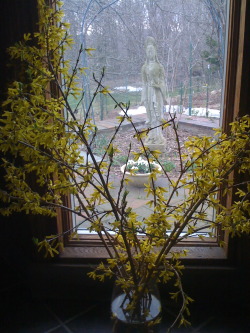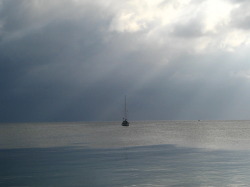 Wire pea fences, with supporting bamboo polesThe tempo of life has changed since Easter. The long, deliberate, muffled days of Lent have turned into a flurry of events with friends and family, and a lot of farmwork. In the last ten days, we've been celebrating life in many of its stages: a coming birth, a newly adopted baby, three year old twins, a sixty-fifth birthday, and a marriage. We've installed pea fences (like a trellis), pruned back berry bushes, planted rows and rows of brassica plants, and started more than 100 tomato plants. In all the excitement, I've found that I'm missing some of the structure that I had built into my Lenten days.
Wire pea fences, with supporting bamboo polesThe tempo of life has changed since Easter. The long, deliberate, muffled days of Lent have turned into a flurry of events with friends and family, and a lot of farmwork. In the last ten days, we've been celebrating life in many of its stages: a coming birth, a newly adopted baby, three year old twins, a sixty-fifth birthday, and a marriage. We've installed pea fences (like a trellis), pruned back berry bushes, planted rows and rows of brassica plants, and started more than 100 tomato plants. In all the excitement, I've found that I'm missing some of the structure that I had built into my Lenten days.
During Lent, I began each day by writing about half an hour of stream-of-consciousness "morning pages," to clear out the mental and emotional debris, to chase away those formless, lurking anxieties that somehow are so skilled at popping out at you when you least expect it. Then, once settled, I wrote for about an hour (at least 1000 words) about my experiences with spirituality and religion, trying to piece together a narrative from my childhood through today.
It has been like digging in the dirt, pulling out old roots and rocks, and preparing the soil to support new life. It's been hard and uncomfortable at times. It's caused me to look up long-lost friends and pull out old pictures. But I've been supported in it by the little structure I created: daily practice, time limits, no censoring voices.
I realized, this morning, as I jumped from websites about the "emerging church" to podcasts on "incendiary theology" (Peter Rollins), to political blogs, to columns about the never-ending Roman Catholic clergy abuse scandal (Nicholas Kristof), to my bills and emails, and then to perusing homesteads in Western Massachusetts, that I've got to re-install my own personal trellis. I don't want my new shoots and leaves to get drowned in a deluge. I want to grow toward the light. But it's so easy to forget about those little structures, to forget that without a trellis, I can get a bit wild, going off in all directions at once. I've got to recognize that which actually supports me, and take hold, while everything is unfurling and emerging and becoming what it is and will be.
I've got a song stuck in my head since Lent--it's a Taize chant called "Watch and Pray (Stay with Me)." It's rather dark, simple and clarifying. You can listen to it here. I suppose that it's a Lenten season song, given that Jesus asked his disciples to watch and pray with him, in the last hours in the garden of Gethsamane. But haunting melodies don't restrict themselves to the liturgical calendar, and the tune has been playing, low, pianissimo, in the background of my days. Maybe that melody has been calling me back to myself, asking me to find my little internal structures, to get rooted again, to prepare and prepare for the growing that is to come.





